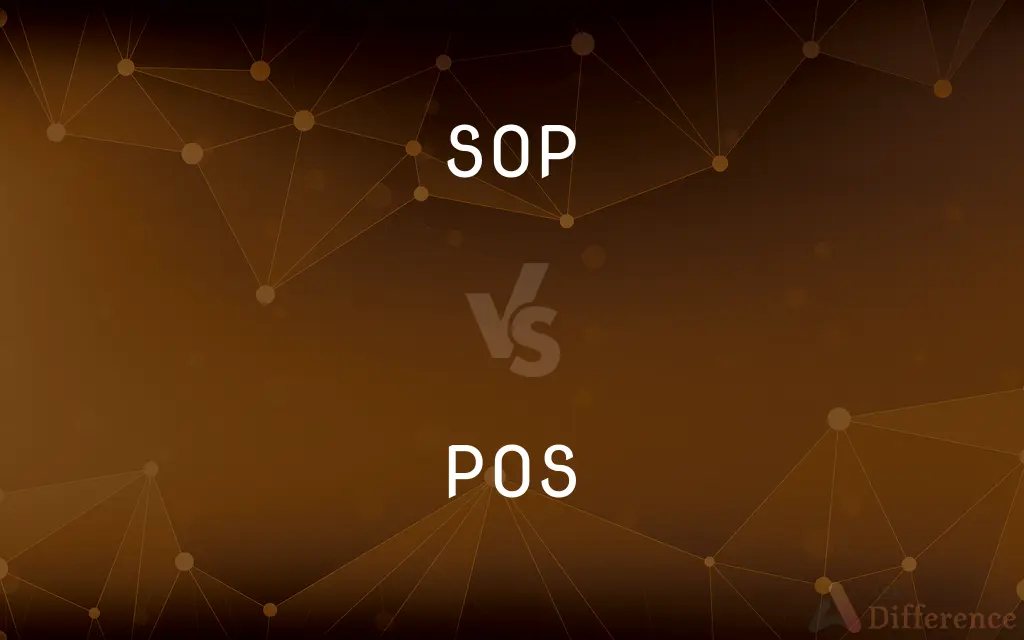SOP vs. POS — What's the Difference?
By Tayyaba Rehman — Published on January 1, 2024
SOP (Standard Operating Procedure) is a set of instructions for operations; POS (Point of Sale) refers to the time and place where sales transactions occur.

Difference Between SOP and POS
Table of Contents
ADVERTISEMENT
Key Differences
Standard Operating Procedures (SOPs) are detailed, written instructions to achieve uniformity in the performance of specific functions. They are crucial in complex operations, ensuring consistency and efficiency. In contrast, Point of Sale (POS) refers to the system or location where a transaction is completed, such as when purchasing items in a store or processing payments in a restaurant.
SOPs are utilized across various industries, from manufacturing to healthcare, to standardize practices and maintain quality control. They serve as a guide for employees to perform tasks correctly and safely. POS, however, is mainly used in retail and hospitality industries, acting as a hub for processing customer transactions, tracking sales, and managing inventory.
The creation of an SOP involves documenting every step of a procedure, making it essential for training new employees and auditing purposes. It ensures that every task is performed consistently, regardless of who is executing it. On the other hand, a POS system can range from simple cash registers to advanced software systems that integrate sales, inventory management, and customer relationship management (CRM).
SOPs play a critical role in compliance and quality assurance, especially in regulated industries where precise procedures are mandatory. Conversely, POS systems enhance customer service and business operations, providing real-time data that helps in decision-making and streamlining business processes.
While SOPs are about process and procedure management, POS systems are about transactional efficiency and data management. Both are essential in their respective areas, SOPs ensuring operational excellence and POS systems enabling effective sales and customer interactions.
ADVERTISEMENT
Comparison Chart
Primary Function
Provide detailed instructions for tasks
Facilitate and record sales transactions
Industry Usage
Various industries for process standardization
Mainly retail and hospitality for transactions
Focus
Process and procedure management
Transactional efficiency and data management
Role in Business
Ensures consistency and quality control
Enhances customer service and sales tracking
Implementation
Documented guidelines and protocols
Hardware and software systems
Key Benefits
Improves training, quality, and compliance
Streamlines sales, inventory, and CRM
Compare with Definitions
SOP
SOP is a set of step-by-step instructions compiled by an organization.
The laboratory followed strict SOPs for handling chemical samples.
POS
POS systems manage sales and inventory.
Our POS system tracks inventory levels in real-time.
SOP
SOP is used for compliance in regulated industries.
Our pharmaceutical company develops SOPs to comply with FDA regulations.
POS
POS is the point where a retail transaction is completed.
The customer made a payment at the POS terminal.
SOP
SOP ensures tasks are consistently performed.
SOPs in our factory ensure every product is manufactured to the same standard.
POS
POS is crucial for customer service in retail.
The POS system streamlined the checkout process for customers.
SOP
SOP aids in maintaining quality and efficiency.
Implementing SOPs improved the efficiency of our workflow.
POS
POS integrates sales with customer management.
Our POS system helps in managing customer loyalty programs.
SOP
SOP is crucial for training employees.
New staff are trained using our detailed SOP manual.
POS
POS includes both hardware and software for transactions.
We upgraded our POS hardware to improve transaction efficiency.
SOP
To dip, soak, or drench in a liquid; saturate.
SOP
To take up by absorption
Sop up water with a paper towel.
SOP
A piece of food soaked or dipped in a liquid.
SOP
Something yielded to placate or soothe
Remarks that were a sop to conservative voters.
SOP
A bribe.
SOP
Something entirely soaked.
SOP
A piece of solid food to be soaked in liquid food.
SOP
Something given or done to pacify or bribe.
SOP
A weak, easily frightened or ineffectual person; a milksop
SOP
(Appalachian) Gravy.
SOP
(obsolete) A thing of little or no value.
SOP
A piece of turf placed in the road as a target for a throw in road bowling.
SOP
(transitive) To steep or dip in any liquid.
SOP
(intransitive) To soak in, or be soaked; to percolate.
SOP
Anything steeped, or dipped and softened, in any liquid; especially, something dipped in broth or liquid food, and intended to be eaten.
He it is to whom I shall give a sop, when I have dipped it.
Sops in wine, quantity, inebriate more than wine itself.
The bounded watersShould lift their bosoms higher than the shores,And make a sop of all this solid globe.
SOP
Anything given to pacify; - so called from the sop given to Cerberus, as related in mythology.
All nature is cured with a sop.
SOP
A thing of little or no value.
Garlands of roses and sops in wine.
SOP
To steep or dip in any liquid.
SOP
Piece of solid food for dipping in a liquid
SOP
A concession given to mollify or placate;
The offer was a sop to my feelings
SOP
A prescribed procedure to be followed routinely;
Rote memorization has been the educator's standard operating procedure for centuries
SOP
Give a conciliatory gift or bribe to
SOP
Be or become thoroughly soaked or saturated with a liquid
SOP
Dip into liquid;
Sop bread into the sauce
SOP
Mop so as to leave a semi-dry surface;
Swab the floors
SOP
Become thoroughly soaked or saturated with liquid
SOP
Cover with liquid; pour liquid onto;
Souse water on his hot face
Common Curiosities
What can a POS system track besides sales?
A POS system can track inventory, customer data, and employee performance.
How do SOPs benefit an organization?
SOPs ensure consistency, quality control, and help in regulatory compliance.
Where are SOPs commonly used?
SOPs are used in various industries for standardizing processes.
What is the purpose of a POS system?
A POS system facilitates and records sales transactions.
Can POS systems handle online transactions?
Yes, modern POS systems can process both in-store and online transactions.
Are POS systems only for retail businesses?
While most common in retail, POS systems are also used in hospitality and other service industries.
What role do SOPs play in employee training?
SOPs provide a clear framework for training new employees on standard procedures.
How often should SOPs be reviewed?
SOPs should be reviewed regularly to ensure they remain relevant and effective.
Can SOPs be modified?
Yes, SOPs can be updated as procedures and regulations change.
What does SOP stand for?
SOP stands for Standard Operating Procedure.
Who creates SOPs in a company?
SOPs are typically created by management or specialized teams within a company.
Is a POS system essential for small businesses?
A POS system can significantly improve efficiency even in small businesses.
Do all POS systems require hardware installation?
Some POS systems operate purely on software, while others require hardware like scanners and registers.
Can POS systems integrate with other business software?
Many POS systems can integrate with accounting, CRM, and inventory management software.
Are there industry-specific SOPs?
Yes, SOPs are often tailored to meet the specific requirements of different industries.
Share Your Discovery

Previous Comparison
Net Investment vs. Gross Investment
Next Comparison
Keynote vs. PowerPointAuthor Spotlight
Written by
Tayyaba RehmanTayyaba Rehman is a distinguished writer, currently serving as a primary contributor to askdifference.com. As a researcher in semantics and etymology, Tayyaba's passion for the complexity of languages and their distinctions has found a perfect home on the platform. Tayyaba delves into the intricacies of language, distinguishing between commonly confused words and phrases, thereby providing clarity for readers worldwide.














































